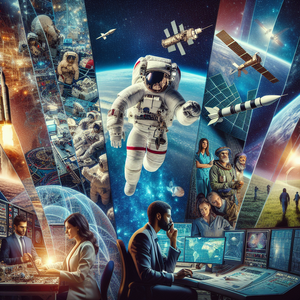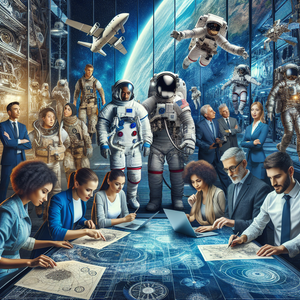The Space Economy: Careers Beyond Earth

The concept of a space economy encompasses all commercial activities in outer space, including satellite communications, space tourism, resource extraction, and research. According to a report by Morgan Stanley, the space industry could be worth over $1 trillion by 2040, driven by advancements in technology and increasing interest from private investors. The rise of companies like SpaceX, Blue Origin, and Virgin Galactic is pioneering this new landscape, offering opportunities that were once confined to science fiction. For instance, SpaceX’s reusable rocket technology has significantly reduced the cost of launching payloads into orbit, making space more accessible than ever. Similarly, Blue Origin is working towards suborbital tourism, enabling individuals to experience weightlessness and view Earth from above. Such innovations not only advance space exploration but also open up new career paths for those interested in joining this frontier.
Careers in Space Exploration and Commercialization
1. Space Tourism Professionals: As companies race to make space travel accessible to the masses, the need for space tourism professionals is on the rise. Roles such as mission planners, astronaut trainers, and customer service representatives are crucial for ensuring that commercial space flights run smoothly. For example, companies like Virgin Galactic have invested in training programs aimed at educating future astronauts on the nuances of space travel. These professionals must possess strong communication skills, be well-versed in safety protocols, and have a solid understanding of astronaut experiences, enhancing the overall customer experience in a nascent industry. 2. Asteroid Miners: Asteroid mining is poised to revolutionize resource acquisition and sustainability on Earth. Professionals in this field will require expertise in robotics, engineering, and geology. Companies like Planetary Resources and Deep Space Industries are leading the way in developing the technology needed to extract valuable minerals from asteroids. For instance, platinum group metals found in asteroids could significantly reduce our reliance on terrestrial mining while providing a new source of wealth. This emerging field offers a unique blend of engineering and environmental stewardship, attracting individuals who are passionate about sustainability and innovation. 3. Extraterrestrial Colonization Experts: As plans for human settlements on Mars and the Moon gain traction, the need for experts in extraterrestrial colonization will grow. These roles could include habitat designers, life support engineers, and agricultural specialists. The challenges of creating sustainable living conditions on other planets require innovative thinking and a multidisciplinary approach, combining knowledge from fields like biology, engineering, and environmental science. NASA’s Artemis program, which aims to return humans to the Moon by the mid-2020s, exemplifies the need for such expertise, highlighting the importance of cultivating a workforce capable of tackling the complexities of living off-planet.
Educational Pathways and Skills Required
To thrive in the space economy, aspiring professionals should consider educational pathways in science, technology, engineering, and mathematics (STEM). Programs in aerospace engineering, astrophysics, and robotics provide the foundational knowledge needed for many of these roles. For instance, institutions like MIT and Stanford are at the forefront of space research and education, training the next generation of space explorers and innovators. Additionally, skills in project management, critical thinking, and teamwork will be essential as professionals collaborate across disciplines to achieve ambitious goals. Internships and hands-on experience with organizations like NASA, private space companies, or research institutions can also provide invaluable insights and networking opportunities. As the industry evolves, continuous learning and adaptability will be key traits for success in the ever-changing landscape of space exploration.
Implications for Our Future
The expansion of the space economy is not merely about creating jobs; it represents a shift in humanity's relationship with the cosmos. As we venture further into space, ethical considerations surrounding resource extraction, environmental impacts, and the potential for space colonization must be addressed. Collaboration between governments, private organizations, and international bodies will be critical in establishing guidelines that ensure the responsible use of space resources. Moreover, as we develop technologies for living and working in space, there may be unexpected benefits for life on Earth. Innovations in materials science, sustainability practices, and even healthcare could emerge from the challenges faced in the space economy, ultimately enhancing our quality of life. For example, technology developed for water recycling on the International Space Station has been adapted for use in arid regions on Earth, showcasing the potential for cross-pollination of ideas.
The space economy is a testament to humanity's relentless pursuit of knowledge and exploration. As we look beyond our planet, new career opportunities are emerging that promise to reshape the job market and redefine our understanding of what is possible. By investing in education, fostering innovation, and addressing ethical considerations, we can ensure that the exploration of space benefits all of humanity. The stars are no longer just a distant dream; they are becoming a tangible reality, and the future is bright for those ready to seize the opportunities that lie ahead. As we explore the potential of the cosmos, we are not only expanding our horizons but also creating a legacy for future generations—one where the sky is no longer the limit, but merely the beginning.
Space Mission Planner
SpaceX, NASA, Blue Origin, and private space tourism companies
Responsibilities
Develop and coordinate detailed mission plans for spaceflights, including timelines, resource allocation, and risk assessments.
Collaborate with engineering teams to ensure all technical specifications are met and safety protocols are adhered to.
Analyze data from previous missions to improve future mission strategies and outcomes.
Required Skills
Strong analytical and problem-solving abilities with a background in aerospace engineering or physics.
Excellent communication skills to effectively collaborate with multidisciplinary teams.
Familiarity with project management software and mission simulation tools.
Orbital Robotics Engineer
NASA, Planetary Resources, and other aerospace engineering firms
Responsibilities
Design and develop robotic systems for satellite servicing, asteroid mining, or extraterrestrial exploration.
Conduct testing and simulations to ensure robots can operate in harsh space environments.
Collaborate with software engineers to integrate AI and machine learning capabilities into robotic systems.
Required Skills
Proficiency in robotics, mechanical engineering, or a related field, with hands-on experience in robotics design and programming.
Knowledge of space mission requirements and environmental challenges.
Experience with CAD software and programming languages such as C++ or Python.
Space Environmental Scientist
NASA, European Space Agency (ESA), and research institutions focused on space studies
Responsibilities
Study the impacts of space missions on the environment of celestial bodies and the Earth’s atmosphere.
Conduct research on sustainable practices for extraterrestrial resource utilization and habitat construction.
Develop models to predict the ecological effects of human activities in space.
Required Skills
Advanced degree in environmental science, planetary science, or a related field.
Strong research and data analysis skills, with proficiency in statistical software.
Ability to work collaboratively with engineers and policy makers to implement eco-friendly practices.
Space Agriculture Specialist
NASA, research universities, and private companies focused on sustainable agriculture in space
Responsibilities
Design and implement agricultural systems for growing food in extraterrestrial environments, such as Mars or the Moon.
Research plant biology and genetics to optimize crops for growth in controlled environments with limited resources.
Collaborate with engineers to develop life support systems that integrate food production with air and water recycling.
Required Skills
Background in agricultural science, horticulture, or a related field, with experience in controlled-environment agriculture.
Knowledge of hydroponics, aeroponics, and soil-less cultivation techniques.
Strong problem-solving skills and the ability to adapt to challenging conditions.
Space Policy Analyst
Government agencies, think tanks, and international organizations focused on space policy
Responsibilities
Analyze and develop policies related to space exploration, resource utilization, and international cooperation in space activities.
Monitor legislative developments and advocate for effective space governance and ethical considerations in the space economy.
Prepare reports and presentations to communicate findings to stakeholders, including government agencies and private sector partners.
Required Skills
Degree in political science, international relations, or law, with a focus on space law or policy.
Strong research, writing, and communication skills to articulate complex issues clearly.
Understanding of the technical aspects of space missions and the implications for policy-making.


